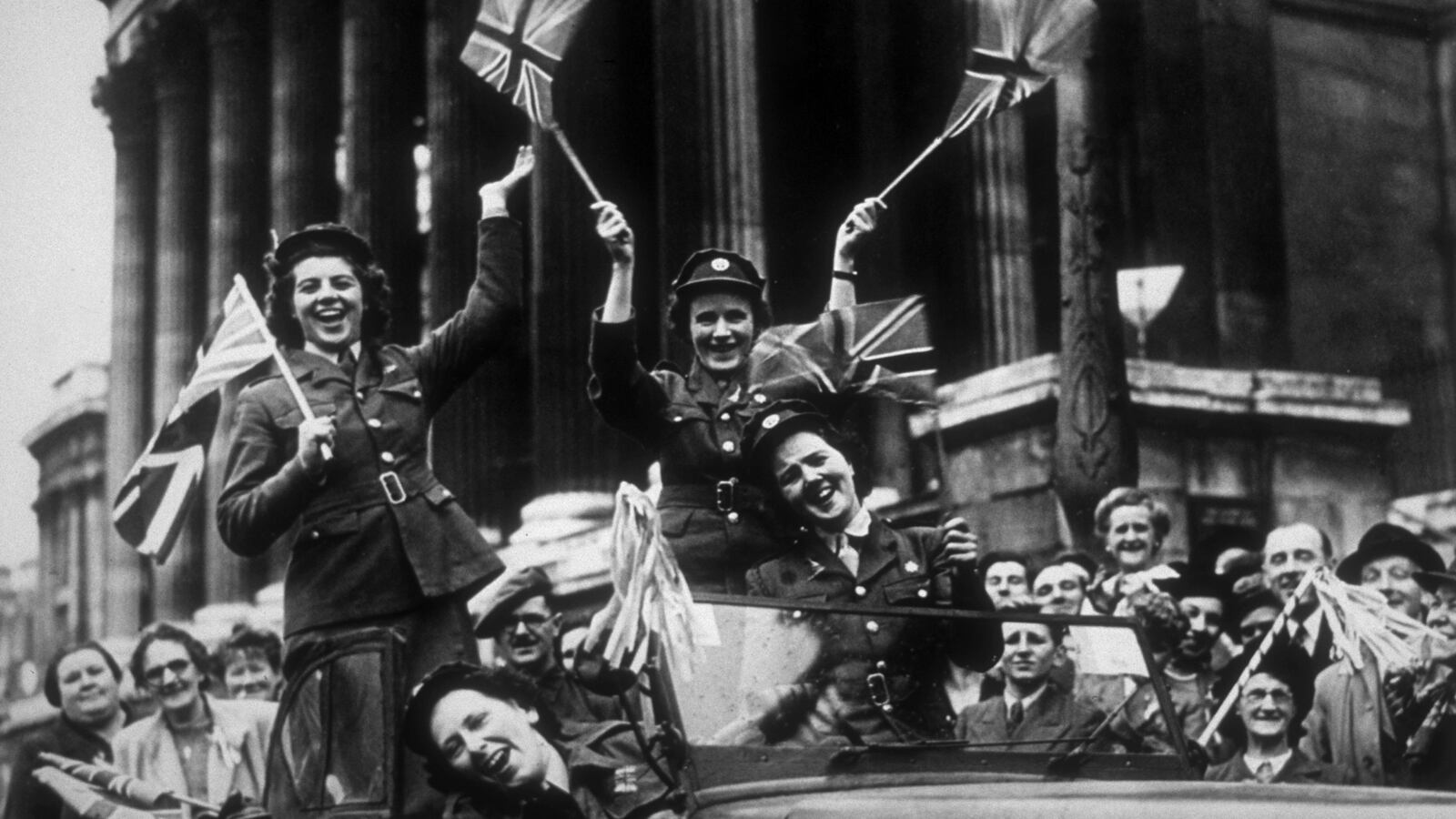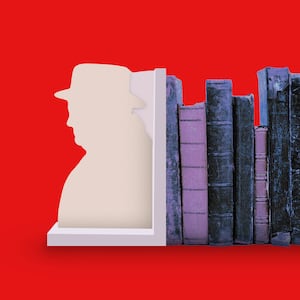Sunday, May 13, 1945, the first weekend of peace in Europe: in London it is the hottest weather of the year, 85 degrees, and the skies are clear when a vast force of 1,500 U.S. bombers and fighters flies over the capital, marking the final Allied victory over Hitler.
A few days earlier, on VE Day, May 8, so many people poured into London from the suburbs to celebrate in the streets that there were not enough trains to take them home, so they just stayed. Many were still there for the Sunday fly-past.
The upcoming celebrations of the 75th anniversary of VE Day have been seriously curtailed by the coronavirus lockdowns both here and in Europe. (More Londoners have been dying than in the worst weeks of the Blitz.) As we struggle to defeat a new and lethally pervasive enemy, this is surely a moment to savor what victory looks and feels like.
But it’s also a reminder that, as sweet as those days were, much of the world was ravaged. The cost in human lives and suffering was immense. At least 20 million Europeans died, and 60 million were uprooted from their homes. At the end of the war, many people were just hanging on to life. At the same time, tensions already were evident that foreshadowed the next war, the Cold War.
There is a unique way to see this moment in history—through the actual words of the reporters who were there to experience the whole gamut of emotions, from the exultations of freedom to the shock of seeing the human cost of liberation.
By pure chance, my wife Mimi discovered in some family papers a well preserved copy of the May 13, 1945, issue of The Observer, a British national newspaper published on Sundays.

The range of reporting in just eight densely packed pages (newsprint was rationed) proves that journalism is, indeed, often the first draft of history, a view of the world captured at a precise moment that has the added edge of immediacy:
HOLLAND
After a tour of Utrecht, Amsterdam, The Hague and Rotterdam a reporter writes:
“All the increase in the number of deaths has not been due directly to starvation but to weakness, which has made the people more subject to infection and less capable of resisting illnesses. Premature births, infant mortality, deaths in childbirth and the incidence of tuberculosis and anemia have all greatly increased.
“Without soap or hot water, without warming foods, and fats, without any means of heating in the cold winter months the people have suffered to an increasing degree from dirt diseases.
“In Rotterdam it is estimated that from 5,000 to 6,000 people are so undernourished as to require special hospital treatment, including in some cases intravenous feeding. A large number are suffering from hunger. Food ship cargoes had to be broken into to feed the dockers before they could unload the vessels, and one of the first ships in the harbour was used to give an extra ration to nursing staffs.”
GERMANY
“An authoritative statement on the food Europe may receive from democracy’s larder in the first year of victory disclosed yesterday that the German people in the British and American zones of occupied Germany will receive a substantial portion of the 12,000,000 tons of food which the U.S. is planning to ship to Europe. Officials describe this as ‘an unpleasant necessity.’”
GUERNSEY, THE CHANNEL ISLANDS
The Channel Islands were the only part of British soil occupied by the Nazis.
“Loudest cheer at St. Peter Port today, when the main British liberating force arrived, was not for the thousands of soldiers, armed to the teeth, who got their share, but for the austere London civil servant who walked up from the first assault craft firmly holding his bowler hat on his head, clutching his tightly rolled umbrella with his right hand and at the same time obviously concerned about the dispatch case tucked under his right arm.
“The dispatch case carried by the civil servant, Mr. C. D. Bickmore, was important because in it were some of the plans for the complete rehabilitation of this half-starved island.”
PARIS
“At least 24 hours before the official announcement everyone in Paris appeared to know the exact hour at which the cease fire would sound, and one evening paper was seized by the police for spilling the news prematurely. Apart from the much discussed misdemeanor of one of the news agencies, the German Radio at Fiensburg had made an announcement which was repeated by the French radio and then contradicted a little while later.
“After all this it was hardly surprising that there was an unofficial celebration on Monday night, with songs and processions in the streets and aeroplanes dropping many coloured flares among the chimney pots. But the real excitement began early on Tuesday morning. Bands of youths and girls marched to and fro in military formation, chanting “Avec Nous! Avec Nous! and gradually swelling their numbers until by midday the crowds were so enormous that many of the main streets and squares were quite impassable.
“They remained so the whole Tuesday and Wednesday. At three o’clock on Tuesday afternoon I managed to force my way near enough to a loudspeaker at the Place de la Concorde to listen to the official announcement. Then came De Gaulle’s voice: ‘The war is won. This is victory.’”
MADRID
“For the sake of external appearances General Franco puts on the face of mercy. He has decreed an amnesty for political exiles which is obviously a fake one. He announces ‘The Rights of the Spaniards’ which is nothing but a fake constitution given by the same man who only some months ago was referring to democracy and liberalism as the great perils of the nefarious nineteenth century.”
AUSTRIA
“The Red Armies had stood outside Graz for some time; Russia had rigidly abided by the zoning agreement, it had not overstepped into the British zone of occupation. But as a result of French claims for a zone of occupation the situation had become fluid, and earlier agreements were under discussion.
“Anyhow, last Thursday the Russians moved into Graz. They may have feared disorder or they may have trouble in Vienna from underground Nazis or they may have political motives. We cannot tell. But they moved in and issued a series of extraordinary ordinances to the population.
“A Soviet Town Mayor took over. The population was ordered to give up its wirelesses [radios]—receiving as well as transmitting. They were told they must give no information about the Red Army.”
From 1945 until 1955, Austria was divided into four occupation zones under the U.S., Britain, France, and Soviet Russia. Graz ended up in the British zone.
CZECHO-SLOVAKIA
“A suicide wave is sweeping through both the German Army and German civilian inhabitants following the example set by Conrad Henlein, the Nazi Gauleiter of the Sudetenland. A number of German officers who have led the remnants of their troops into the American lines east of Pilsen have shot themselves. There have also been many cases of German women killing themselves and their children in the towns and villages between Pilsen and Prague.”
PARIS - HIMMLER REPORTED CAPTURED
“Himmler is now reported to be in our hands, according to a broadcast from Paris to New York by Charles Collingwood, CBS reporter. It is understood, added Collingwood, that Himmler was held by Admiral Doenitz in the Fiensburg area under house arrest and that Doenitz turned him over to British forces. A small party of high Nazi war criminals escaped in a long-range speedboat from Jutland one night last week according to reports.”
Heinrich Himmler was a main instigator of the Holocaust and one of the most powerful of the Nazi leaders. He was not, in fact, held by Doenitz, Hitler’s successor, who surrendered to the Allies. He was on the run using an alias when captured by British troops near Hamburg on May 23. Under interrogation he admitted who he was. While doctors examined him he bit into a potassium cyanide pill and died. As for the speedboat, nobody knows who was on board, but several top Nazis found refuge in South America.
FROM THE FINANCIAL PAGE
“The public will be in for disappointment if it expects that peace in Europe will immediately be synonymous with plenty, whether it be plenty of goods to buy or plenty of leisure to enjoy. Consumers’ rationing will stay, but the rations may gradually become more plentiful. Restrictions on building and fuel consumption will stay.”
Food and materials rationing continued in Britain after the war; clothes until 1949, gasoline until 1950 and meat and bacon until 1954.
FROM THE WOMEN’S EDITOR
“Co-operation between saleswomen and customers and a piece of good fortune in the arrival of merchandise which should have reached the shops last September temporarily eased the stock problem but on the whole the difficulties have never been worse.
“Everywhere, shortages are reported. The corset trade is 8,000,000 items below its normal stocks. The shoe trade is 25 percent short of stock and the poorer material has to stand up to harder wear. Reallocation of military sole leather to civilian needs will ease the situation but the world shortage of leather gets worse instead of better because of the heavy slaughtering of herds.”
FROM THE OP-ED PAGE: HOW LONG CAN JAPAN LAST?
“It has often been said that the Japanese will suffer anything rather than give in: their conduct in battle certainly supports that view. Yet one cannot help wondering whether, in the background, the half-dozen big firms, Mitsui, Mitsubishi, Okura, etc, which control all Japan’s industry, commerce, and finance, are suggesting to the soldiers that Japan could do better now by giving in rather than by persisting in a hopeless struggle.”
At the Potsdam Conference of the major powers on July 24, 1945, President Harry Truman told the Soviet leader, Joseph Stalin, that the U.S. had developed “a new weapon of unusual destructive force.” Stalin, according to Truman, “showed no special interest.” On August 6 the U.S. dropped the world’s first atomic bomb on Hiroshima, killing 80,000 people. A second atomic bomb was dropped on the city of Nagasaki on August 9, killing tens of thousands more. Japan surrendered on August 15.
LONDON
“The victory arrangements worked well. It seems to have been generally felt that there might have been more and better music. Still, these things are not easy to arrange on the spur of the moment. People managed to dance with or without the tunes.
“Everyone will have pleasant memories of some characteristic spectacle, of American soldiers, for example, near the Marble Arch, sometime after midnight, and in all sobriety, teaching a troop of the local ladies to dance a Virginia Reel.”
On the day of the paper’s publication, King George VI and Queen Elizabeth went from Buckingham Palace to St. Paul’s Cathedral for a special service of thanksgiving. Hundreds of thousands of people lined the route.






